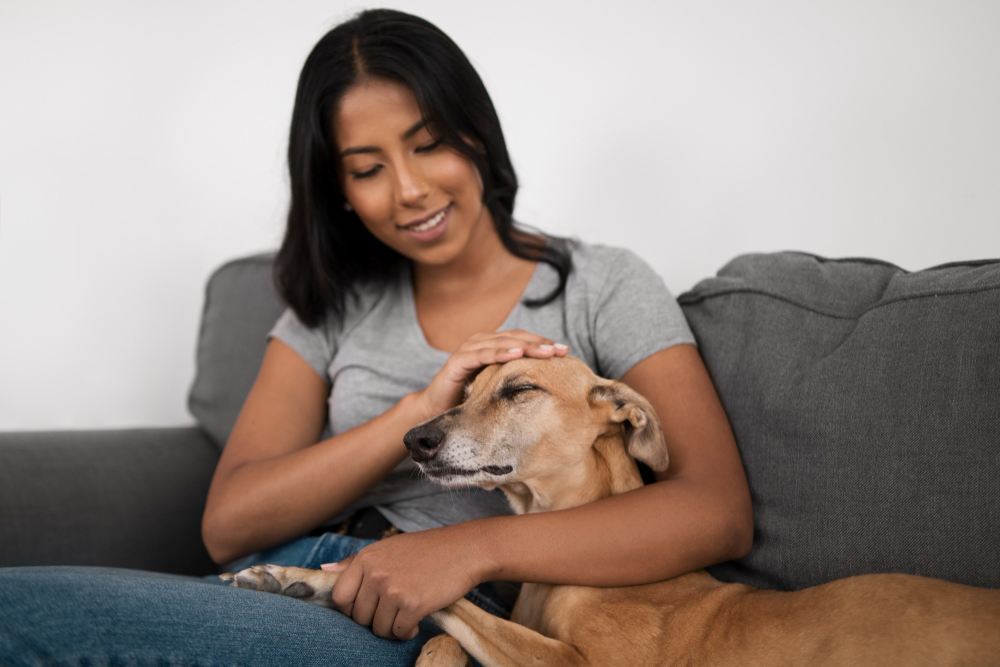Mental Health Benefits of Owning a Pet

In the cacophony of modern life, where screens and social media notifications have become a constant, gentle paws and the heartbeat of a pet can offer a serene escape. The companionship of animals has been cherished since the dawn of civilization, not only for their loyalty but also for their profound impact on human health—especially mental well-being. Owning a pet isn't just about the responsibilities and the cuteness overload; it's a powerful relationship that can significantly improve your mental health.
A Pawsitive Impact on Stress
Stress is a modern epidemic, with nearly 80% of workers reporting they feel stress on the job. However, studies have shown that pet owners tend to have lower heart rates and blood pressure levels when under stress than those without pets. The simple act of petting your cat, dog, or rabbit releases oxytocin—commonly known as the "love hormone"—which has a calming effect on the body. It’s like an invisible leash that tethers you to the present, reminding you that peace can be found in simple, unspoken connections.
The Science Behind the Snuggles
The bond between human and animal runs deep. Neurologically speaking, interactions with pets can reduce levels of the stress hormone, cortisol, and increase levels of serotonin, a neurotransmitter associated with mood regulation. For those wrestling with chronic stress, the benefits can be life-changing, providing a consistent source of comfort in an unpredictable world.
Social Anxiety No More
Pets are social facilitators; they help their humans connect with the world. Dogs need to be walked, cats provide a reason to stay home and relax, and even small animals in apartments prompt conversation. For pet owners, loneliness can be significantly reduced, and building relationships with neighbors and fellow pet owners becomes atypical.
Fuzzy Bridge to a Richer Social Life
A wagging tail at the dog park is an instant conversation starter, while volunteering at shelters can create a social network that transcends the need to own a pet. Social anxiety is often rooted in a fear of judgment and disconnection, but a pet’s non-judgmental affection acts as a bridge back to the richness of social life.
Responsibility and Routine: Structure for Your Day
In the whirlwind of disorders like depression and anxiety, the consistency and obligation of caring for a pet can be a beacon of order. Their routine becomes your own, a simple one that encompasses feeding, exercise, and grooming. The predictability and responsibility help create structure in a day that might otherwise feel purposeless and erratic.
Owning a Pet Can Be Therapy in Itself
The therapeutic effects of this structured routine are profound, even mirroring the strategies used in modern behavior therapies. Pets necessitate getting out of bed to feed them, they prompt physical activity, and their very presence demands accountability to their well-being, all subtly pushing their owners towards positive, stabilizing habits.
Mindful Companion in a Disconnected World
The digital age has brought a paradoxical connection—connected to devices and isolated from each other. Pets counter this trend, continually offering a tangible exchange and compelling attention that grounds us in the here and now. Through simple activities like play, walks, or the observation of aquarium fish, our pets gently nudge us to practice mindfulness and to appreciate the present moment.
An Ode to Observing
Watching and caring for pets is an exercise in non-judgmental awareness and unconditional love. Even amidst the storm of emotions, mental illnesses, and stressful conditions, the simplicity of pet ownership radiates a silent yet overpowering message: life, with all its complications, is worth living.
The Right Pet for Your Mental Health Journey
Just as humans come in different shapes and sizes, our needs do, too. The ideal pet for one person might not be the best fit for another's mental health requirements. It’s important to consider your lifestyle, living situation, and mental health goals when choosing a pet. While cats may suit introverts and those with limited space, dogs thrive in active, social environments. Small mammals like guinea pigs and birds provide companionship without the demands of larger animals.
Finding Harmony in Variety
And what about those with allergies? For many, reptiles and fish can provide the tranquil companionship pets offer, while avoiding the allergens that can be present with fur-bearing animals. Regardless of the animal you choose, the therapeutic effects are as varied and unique as the human-animal bond itself.
Making the Most of Your Four-Legged Therapist
The benefits of pet ownership on mental health can be maximized by the quality of the relationship and the care invested. Regular veterinary check-ups, proper nutrition, exercise, and mental stimulation are as beneficial to the pet as they are to their owner. Furthermore, understanding the needs and behaviors of your pet encourages a deeper and more fulfilling connection.
Training and Bonding: Mutual Growth
Invest in proper training, not just for discipline, but as a means to communicate and understand each other. The time you spend training your pet is as valuable as any other, fostering a harmonious relationship based on mutual respect and growth.
A Healing Touch in the Touchscreen Age
In the face of mental health challenges, the furry, feathered, or scaled companions that share our homes offer a healing touch that the digital world can't replicate. From reducing stress and anxiety to providing a sense of purpose and nurturing social connections, the value of a pet in one’s mental health journey is immeasurable.
The Lasting Legacy of a Loyal Friend
The decision to welcome an animal into your life should not be taken lightly. It’s a commitment to care, a promise of presence, and an investment in well-being. For many, the love and support of a pet have been the difference between despair and a life with meaning. In a chaotic world where battles are often fought within the mind, a pet offers the quiet, steadfast companionship that can turn the tide in favor of mental health.
